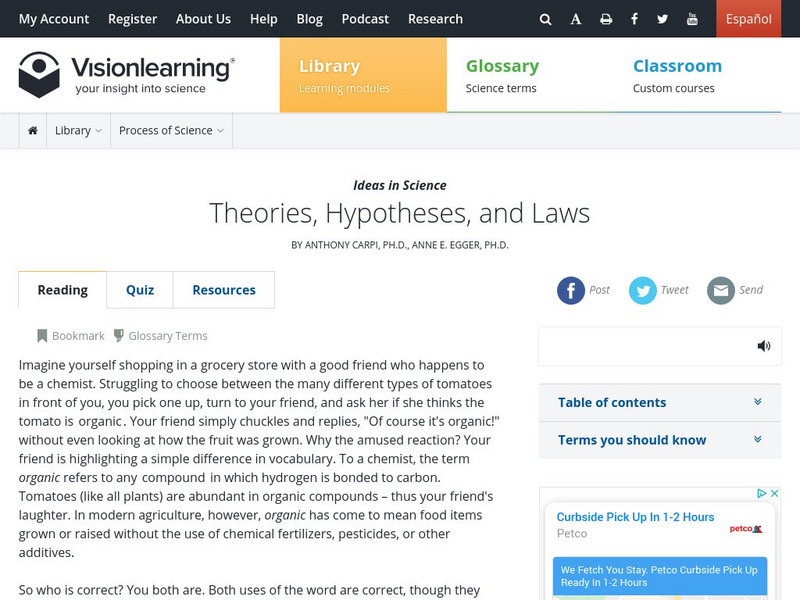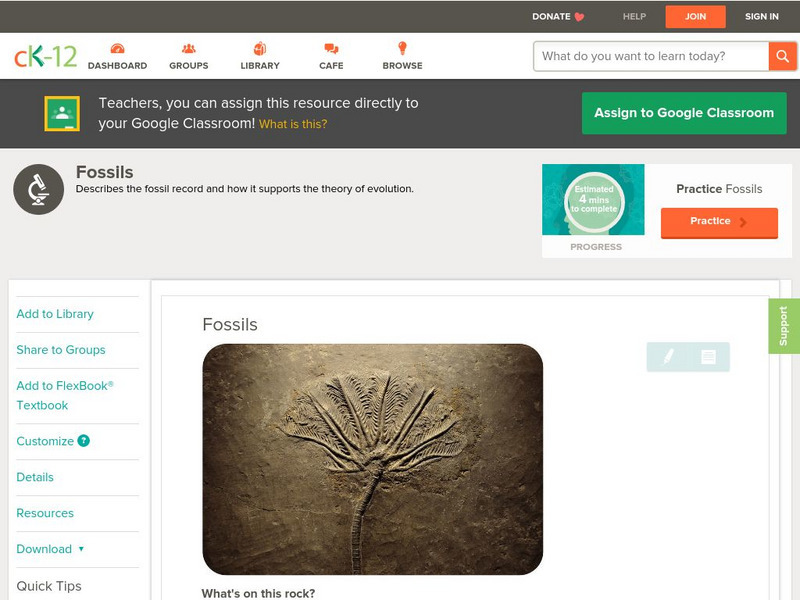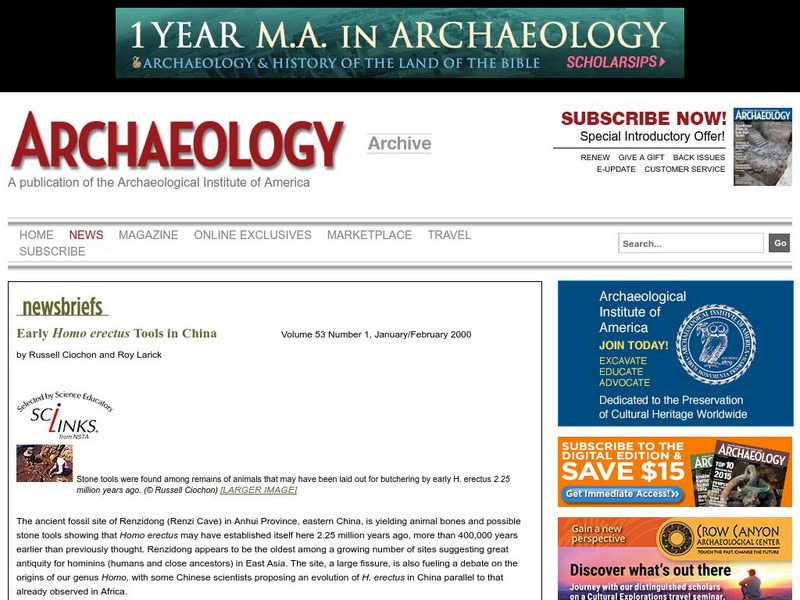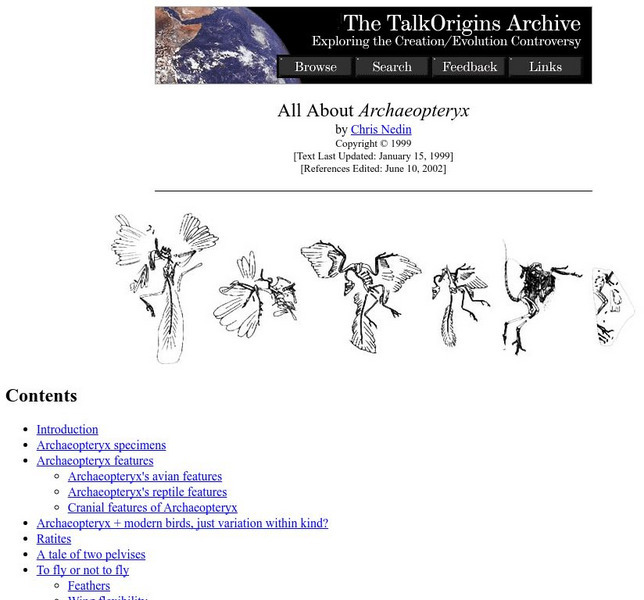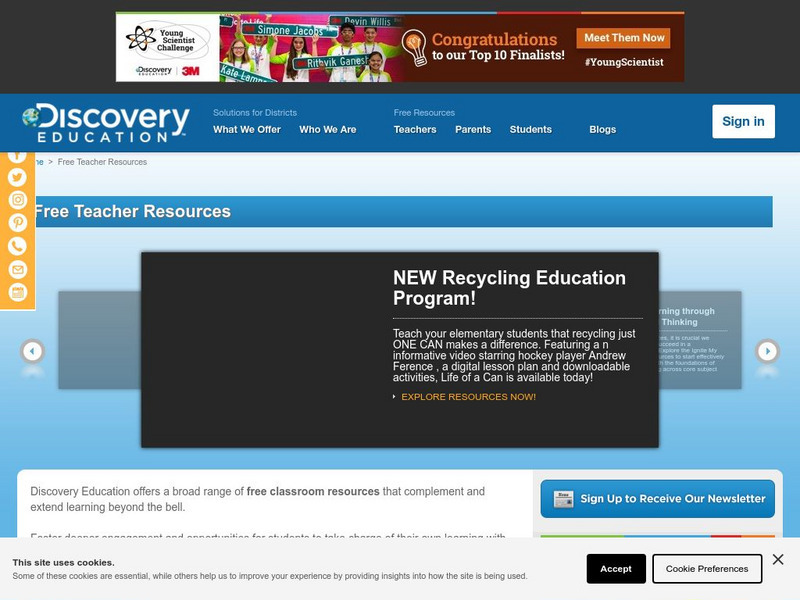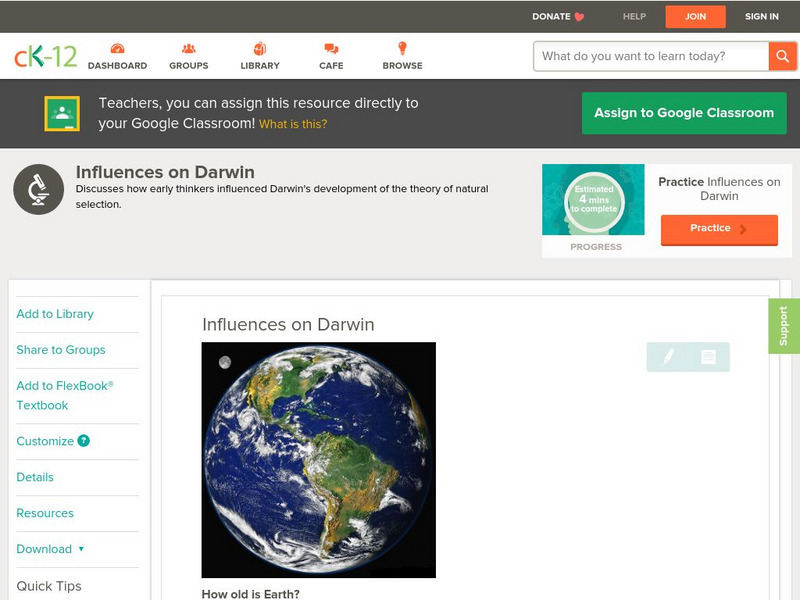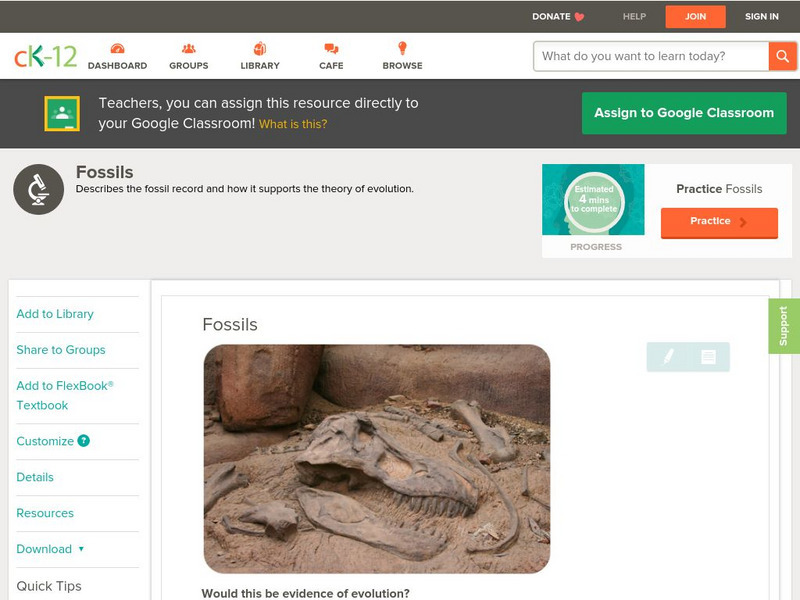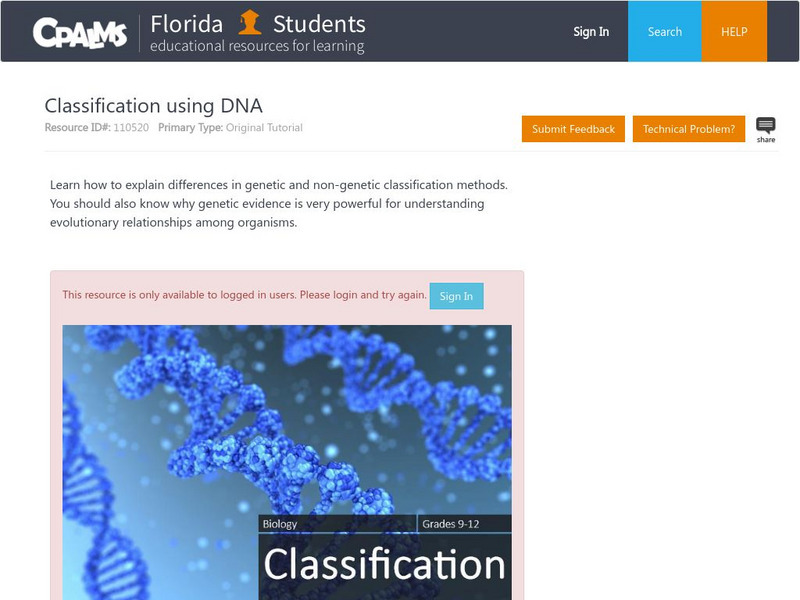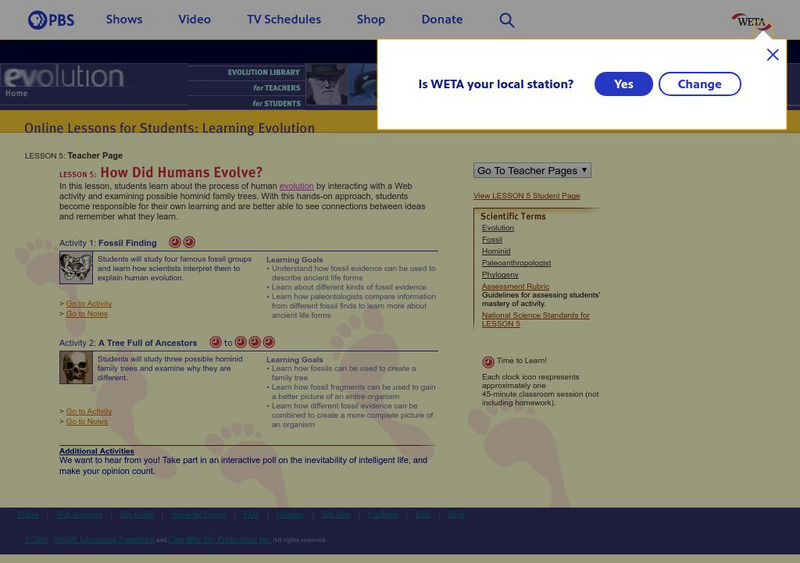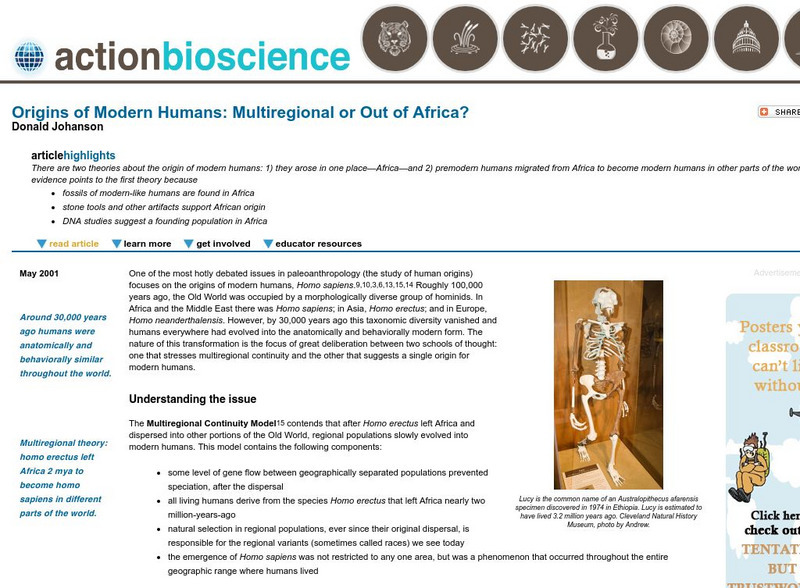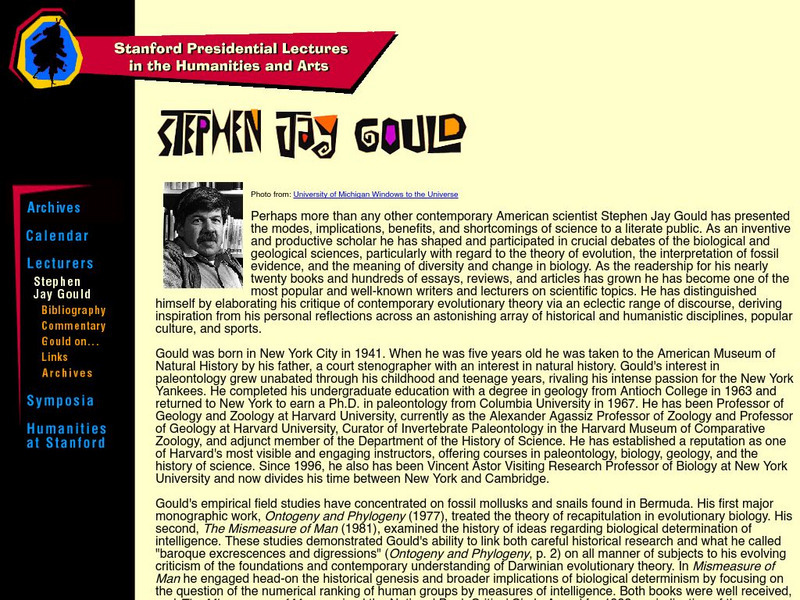PBS
Pbs Learning Media: Early Tetrapod Fossils
In this transcript of an interview filmed for the PBS series "Evolution," scientists Ted Daeschler and Neil Shubin describe the discovery and significance of some of their key fossil finds.
Vision Learning
Visionlearning: Ideas in Science: Theories, Hypotheses, and Laws
Learning module looking at scientific explanations. Discussion covers theories and how they develop, some well-known theories and their origins, and how theories are revised and refined. Also, covers hypotheses and laws. The three...
CK-12 Foundation
Ck 12: Life Science: Fossils
[Free Registration/Login may be required to access all resource tools.] Fossils are the preserved remains of animals, plants, and other organisms from the distant past. By studying fossils, evidence for evolution is revealed....
Georgia Department of Education
Ga Virtual Learning: Ap Biology: Evolutionary Biology
Through informational text, interactive activities, animations, and video clips, students investigate evolutionary biology.
University of California
University of California Museum of Paleontology: Stories From the Fossil Record
This colorful, interactive site demonstrates how fossils can be used to discover a range of information about the past. Topics include Past Lives, Paleoecology, Geologic History, and Biodiversity.
Texas A&M University
Eco Systems: Story Time: Stephen Jay Gould
See how Stephen Jay Gould's early interest in baseball influenced his thought process as a scientist.
Archaeological Institute of America
Early Homo Erectus Tools in China
An article which describes a fossil site in eastern China where evidence has been found that Home erectus may have been active in eastern China some 400,000 years earlier than scientists believed. The authors also summarize the debate...
Talk Origins Archive
Talk Origins: All About Archaeopteryx
Good site which appears to take an unbiased approach to examining the wealth of evidence about the origins of birds. Provides tons of information about specimens, features, feather development, and more.
Smithsonian Institution
National Museum of Natural History: Homo Habilis
This resource provides graphics, as well as explanation, of the remains of Homo habilis.
PBS
Nova: History of the Universe
This interactive timeline provides information on the big bang as well as other major events of universe evolution. It also provides predictions about the universe's future.
Discovery Education
Discovery Education: Birds
This lesson plan explores the evidence that birds evolved from dinosaurs, as well as how we can make judgments about such issues based on scientific research.
CK-12 Foundation
Ck 12: Life Science: Influences on Darwin
[Free Registration/Login may be required to access all resource tools.] When Darwin returned to England at the end of his voyage, he did not rush to announce his discoveries. He did not want to present any ideas unless he had strong...
CK-12 Foundation
Ck 12: Biology: Fossils
[Free Registration/Login may be required to access all resource tools.] Describes how fossils help us understand the past.
CPALMS
Florida State University Cpalms: Florida Students: Classification Using Dna
Identify the differences in genetic and non-genetic classification methods. Why is genetic evidence powerful for understanding evolutionary relationships among organisms? Find out!
CPALMS
Cpalms: Name That Embryo
In this lesson, students will look at images of embryos from different organisms and identify similarities and differences between them to indicate possible evolutionary relationships. Includes PowerPoint and student handouts.
PBS
Pbs Teachers:how Did Humans Evolve?
Explore paleoanthropology by going on a virtual "dig" to answer questions about famous fossil finds. Explain how alternate hominid family trees result from different interpretations of the same fossil evidence.
PBS
Pbs: Comparative Embryology: The Vertebrate Body
Provides a student handout in PDF format that looks at the developmental stages of five vertebrate organisms from fertilization to adult form. Students can look at the pictures to see the similarities and differences at the embryo stage...
University of California
Ucmp: Learning From the Fossil Record
Fossils provide scientists with clues about Earth's past. This site from the University of California's Museum of Paleontology is great for exploring lots of information on fossils.
PBS
Pbs Learning Media: What Killed the Dinosaurs?
This Evolution Web feature explores how evidence can support a variety of hypotheses surrounding the mystery behind the extinction of the dinosaurs.
American Institute of Biological Sciences
Action Bioscience: Origins of Modern Humans: Multiregional or Out of Africa
Two migration theories are on the table for consideration. Weigh the evidence of each one in this article by Donald Johanson of Lucy fame.
Curated OER
Unesco: Israel: Sites of Human Evolution at Mount Carmel
Situated on the western slopes of the Mount Carmel range, the site includes the caves of Tabun, Jamal, el-Wad and Skhul. Ninety years of archaeological research have revealed a cultural sequence of unparalleled duration, providing an...
CK-12 Foundation
Ck 12: Biology: Fossils
[Free Registration/Login may be required to access all resource tools.] Describes how fossils help us understand the past.
Vision Learning
Visionlearning: Cell Biology: Membrane Bound Organelles
Evidence in support of endosymbiosis to show the evolution of organelles within cells.
Stanford University
Stanford Presidential Lectures: Stephen Jay Gould
Standford University provides interesting biographical and professional information on Stephen Jay Gould and his many contributions to scientific thought, including his efforts to help people see science "As something that is important...
Other popular searches
- Dna Evidence for Evolution
- Fossil Evidence of Evolution
- Evidence for Evolution Whale
- Evolution Evidence
- Fossil Evidence Evolution



